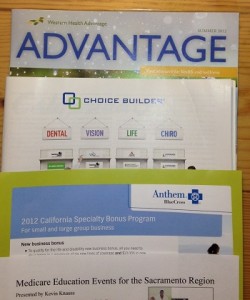When the Affordable Care Act started to be phased in back in 2010 the first action the health insurance companies took to meet the Medical Loss Ratio (MLR) was to cut commissions to their health insurance agents or producers, as they like to call us. The MLR dictates that on individual policies the carrier must spend 80% of their premium dollars on health benefits or improvements and 85% for group plans.
Commission chop
On average, the commissions paid on individual health policies sold through an agent went from 10% to 5%. That was a pretty easy and quick way for the insurance companies to work toward the 80/20 MLR rule. In the wake of the drastic cuts to commissions, various health insurance agent organizations went into high gear to have legislation introduced to remove agent commission from the MLR.
Let the lobbying begin
Access to Professional Health Insurance Advisors Act of 2011, H.R. 1206, would allow states the ability to request a waiver from calculating insurance carriers MLR with the included in the expenditures. When the producer commissions are taken out of the equation it makes it easier for the carriers to meet the 80/20 rule. This bill was recently passed by the Health Subcommittee of the House Energy & Commerce Committee.
Healthcare not bonuses
The aim of the MLR was to limit the spending of premium revenue tied to health insurance policies
on bloated administration salaries and aggressive marketing. For as long as I have been in business, commissions paid to sales representatives have always been classified as marketing. While slightly different, sales commissions are analogous to similar costs for advertising, trade shows, and other marketing programs.
Admin
There is certainly a service component to not only an individual agent acquiring a prospect, but also the time to help the client find the right plan, fill out the application and answer questions from both the individual and carrier. That is the big rub; how much of an agent’s time is spent on marketing to acquire a client and how much on service. But even service could be construed as administration and subject to the MLR.
Specialty bonus programs
Even though entry level base commissions have been cut, insurance companies have not abandoned all monetary incentives for their outside sales representatives. There are incentives for the number of policies written in a specific time period and the accumulated number of plans sold. These bonuses and accumulated clients can lead to higher commissions on each new client sold a policy.
Economies of scale
Most of these incentives favor large general agencies (GA) and field marketing organizations (FMO). If these GAs and FMOs get enough agents in their stable they can push their average commission per policy close to the pre-MLR level. The individual agent under the GA or FMO doesn’t always share in the enhance commission structure because the spread between what they pay the agent and what they get paid from the insurer is the revenue differential that keeps agency running.
As an independent agent that writes policies for several different carriers, depending on what is best for the client, it is difficult for me to reach bonus levels offered by any one carrier. Not only must I compete against other agents for business, GAs and FMOs, I must also compete against the carriers themselves.
Too rich for my marketing budget
Health insurance companies have ramped up their marketing efforts tremendously over the last several years. Type in “health insurance” in your favorite internet search engine and you will see a page full of “pay per click” and “pay per impression” advertisements from insurance companies and lead companies. Most of these companies are bidding $10 to $20 per click to get top ranking on the first page. It is virtually impossible for an independent agent or agency to compete.
Cut out the middle
For every plan an insurance company sells without paying a commission to an agent or agency, even with the cost of internet advertising or direct mail expense, they realize a long term savings in marketing costs over the life of the policy. All these savings go toward meeting the insurance companies MLR. While the insurance companies have nominally endorsed the concept of removing agent commissions from the MLR, their marketing actions speak otherwise.
Medical air lift insurance?
The insurance companies have become more aggressive at adding or enhancing other ancillary products that are not part of the MLR like dental, vision and life insurance that can be added at the time of the health insurance purchase. The commissions on these products have not been effected by the MLR for the agent. With the impending emergence of the state health insurance exchanges, there will be yet another competitor that reduces an agent’s participation in selling health insurance.
The market place of health insurance agents has already been reduced by the recession and the cut in commission. If health insurance agents, particularly independents, are to survive the compensation model has to change. My fear is more agents pushing other insurance policies of dubious value such as cancer, heart attack plans and medical air lift insurance when meeting with a prospective client.
Regardless of what changes are made to the compensation formula for agents, commissions paid on sales of policies are marketing and need to remain as part of the MLR.
